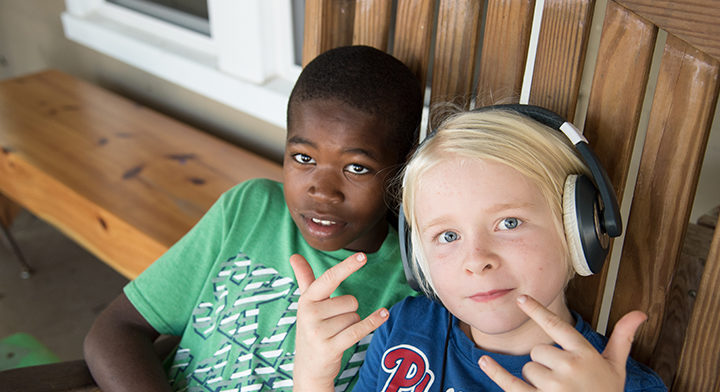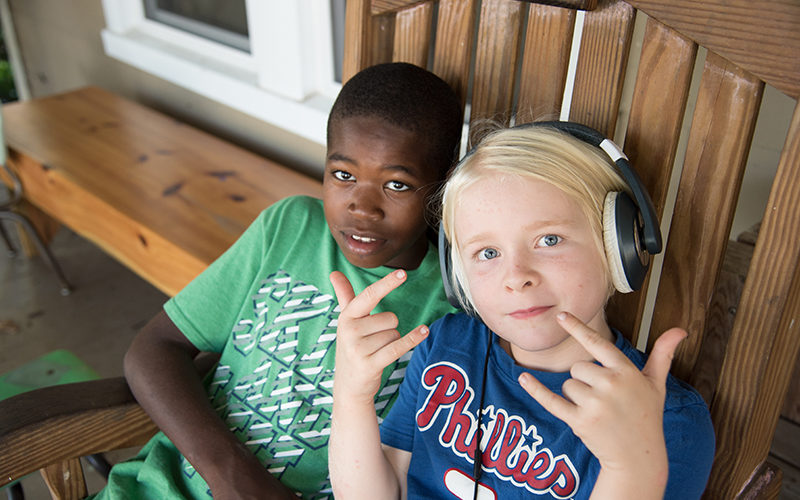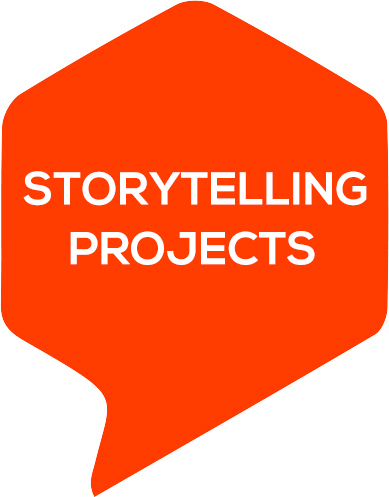Helms Jarrell, co-director of the QC Family Tree intentional Christian community, had given crystal-clear instructions for the youth group’s annual trip to Boone, N.C.
They had just hauled a van-full of Enderly Park teenagers up from Charlotte and the group was allowed one hour of free time on King Street, after which they were to report promptly for the dinner reservation.
An hour passed, but no youth group. What on earth had they gotten into? The Jarrells had no doubt. The notoriously mischievous gang was clearly loafing around the giant barrels of candy at Mast General Store. Except, they weren’t. With no kids in sight, Greg and Helms left Mast General and methodically perused the next stretch of King Street, shop by shop.
Suddenly, they spotted the entire group gathered in a storefront across the street, utterly enthralled in what was happening before their eyes — a potter was turning clay in his shop, all the while answering questions and talking with the kids about his craft.
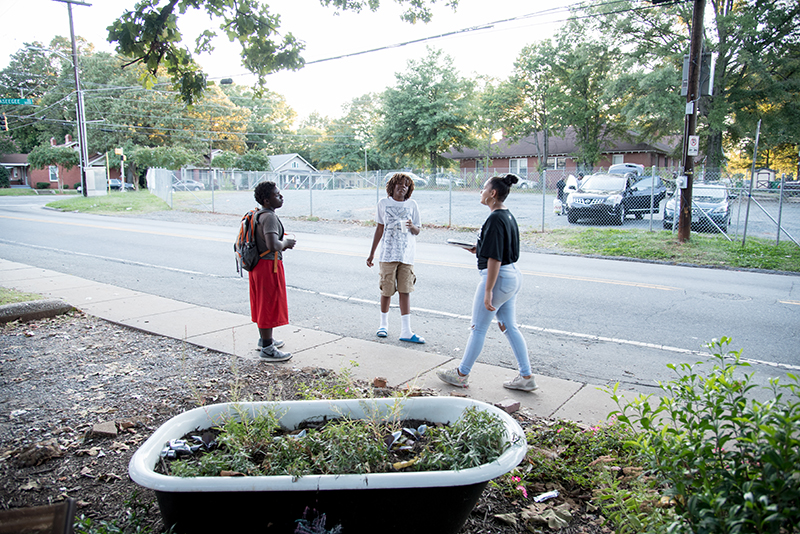
Enderly Park youth consistently gather at the Jarrells’ home where they have created a pottery studio as well as a local hub for social activities. (Photo/Lesley-Ann Hix Tommey)
“That was an ‘aha!’ moment,” says Helms, who, with her husband Greg, has brought together Enderly Park youth for 12 years, seeking ways to inspire their imagination and empower their sense of identity in the world. Through weekly character-building gatherings, serving with their community and forming relationships rooted in mutual trust, the QC Family Tree youth group is seeking justice in their own lives and the life of their community, and challenging a long pattern of disinvestment in the lives of black youth.
A week after returning from Boone, Helms says, Samia Dillard, a 14-year-old member of the youth group, helped draft a grant proposal to create a pottery studio in the clubhouse behind the Jarrells’ home on Parkway Avenue. They got it. So they purchased a kiln, wheels and a mass of supplies for creating ceramic pottery and other art, which now cascades over the walls and shelves of the QC Family Tree pottery studio. Pottery, however, is only one way in which the youth of Enderly Park are imagining their worth and power in the world, Greg says.
“One of the most important parts of justice is using our imaginations, which doesn’t sound very tangible, but you can’t create a world that you can’t imagine.”
“There are multiple layers of imagination built into our pottery project — you have to imagine what a brick of clay can become, then you have to utilize your hands and develop the skill needed to construct what your imagination is telling you is possible. You have to be able to see, but then you have to practice a craft in order to cultivate your desire. In the process of doing that, you begin to imagine yourself differently. These kids have been told by popular culture, American culture and history books that their lives don’t matter. They’re not as important as my children are, just by the virtue of their racial heritage. That imagination has to change.”

Justice for Enderly Park youth means cultivating a positive imagination, Greg Jarrell says, for the possibilities in their life, identity and future. (Photo/Lesley-Ann Hix Tommey)
Enderly Park is marked by stark disinvestment and lack of opportunity for children and teenagers, 86 percent of whom are black and therefore begin with $50,000 less in household income than the average white child in Charlotte, Greg says. The result, as well as the cause? Only half of all Enderly Park residents have attained a high school diploma, with young men being 12 percent more likely than young women to drop out of high school. That’s why, when the Jarrells first moved to Enderly Park in 2005, Helms says, they immediately began gravitating toward their young neighbors, who constantly gathered across the street at the rec center.
Early days convening a youth group involved fierce basketball games with the kids, during which the Jarrells earned the monicker “Old School” and gradually diffused the natural skepticism. Basketball games morphed into youth group dinners, movie nights and holiday outings, and as relationships deepened, larger issues in the students’ lives began to rise to the surface. Gradually, the structure of the QCFT youth group began to reflect a response to those issues as well as an expanding relationship with their families, Helms says.
Earned trips to pick out a Christmas tree or play at the beach became incentives for students to pursue good grades and care about their homework. Regular Wednesday evening “Devos” became a weekly occasion to instill in the students respect for themselves and others. Sleepovers at the Jarrells’ home even became a way to protect children at risk of lingering in the street late at night or fleeing the prospect of their family’s impending eviction. Christmas 2016 finally featured a massive pottery market to display and sell the ceramic art that students had been crafting during the fall, and the youth group took home hundreds of dollars in earned income.
Twenty-year-old Marquell Pettiford grew up in the QC Family Tree youth group and says his experience will not only stick in his memory forever but has formed him as a valuable and compassionate leader in his community.

Marquell Pettiford, former leader with the QC Family Tree youth group, now serves as a local mentor and small business worker in Enderly Park. (Photo/Lesley-Ann Hix Tommey)
“I acquired a lot of traits, a lot of abilities, and it expanded my horizon and made me a more valuable person to the people around me. It sent me on another direction in life,” Pettiford says.
“Who knows who I would have been if I’d never met them, because you have to remember, in the area we’re in there’s a lot of crazy stuff going on around you and it’s easy to get consumed by it. I don’t like to talk about myself, but I don’t really follow too much. I’m my own self and I respect everybody for being their self. And now that I’m getting older I’m learning to respect the truth more. I’m starting to recognize these things and I’m starting to see God every day of my life. Since QC Family Tree, since I picked up those traits, I want to be an impact on people’s lives like they have.”
Pettiford, now a local coffee roaster, rap artist and business student, says the rest of the world doesn’t understand neighborhoods like Enderly Park, which, contrary to popular belief in more privileged communities, is not full of crackheads, prostitutes and gang bangers, he adds. Instead, Pettiford sees a community that he loves deeply, that sticks together and that grows with each other like family. It’s that community, he says, that he and QC Family Tree have both chosen to invest in and be oriented toward in love and solidarity.
Justice for young people like Pettiford usually means entering the kind of slow, steady fight that most tend to ignore. If racism is like an iceberg, Helms explains, the visible portion is overtly racist acts against people of color, with which the larger American conversation is highly preoccupied at the moment. But when you seek true justice with your black neighbors, she adds, you begin to deal with the portion of the iceberg that lies invisible below the surface, namely the kind of white supremacy that permeates all sectors of life and negatively affects everyone in a spiritually, physically, emotionally traumatic way, especially young people.
It’s that kind of injustice — marked by lack of educational opportunity, unsustainable income, over-policing and mass incarceration — that has contributed to the degradation of the family, which is where children truly learn to respect themselves and others, says Cornelia Hagens, a dedicated grandmother and volunteer with the QCFT youth group. Hagens’ constant presence among the youth of Enderly Park is not simply about disciplinary oversight, she explains, but about empowering an entire generation of black youth with reverence for their own character and thoughtfulness toward their path in the world.
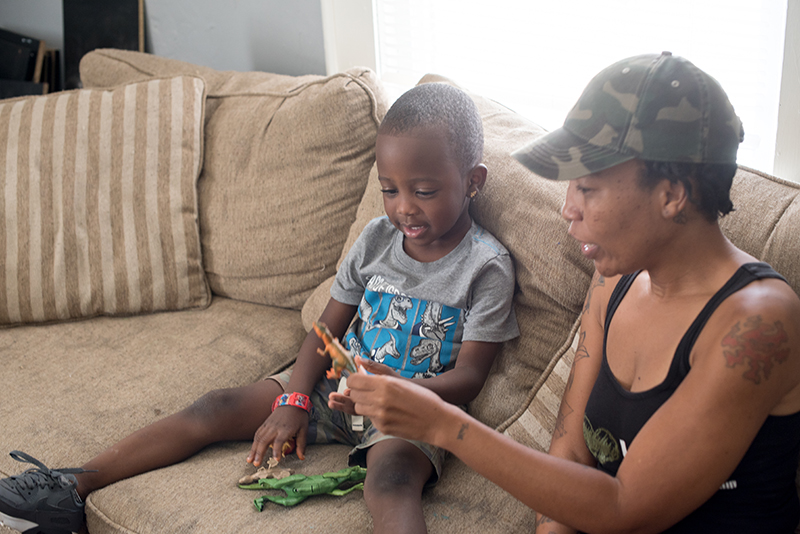
Cornelia Hagens plays with her grandson Kylan at her daughter’s home, owned and leased affordably by QC Family Tree. (Photo/Lesley-Ann Hix Tommey)
“Somebody needs to put it in their heads to have a little respect about yourself, a little motivation about yourself, and say ‘Listen, you’re smart.’”
“They need to hear it from somebody that’s going to show some kind of care for them. In this neighborhood, our kids are doomed. I don’t want to just say black kids, but it seems that way. It’s like a platform laid out for them to go nowhere. It is our responsibility to teach our future, because they are our future. We have nothing without these kids. We want our kids to be leaders. We want our kids to drive our country forward, drive our people forward, because we’re all people. That’s what matters to me, these kids.”
While you can’t empower a generation of young people overnight, Hagens says, you can root yourself in their lives and persist through the systems that keep them unmotivated, uninspired and disrespectful toward their future. It’s a process, she explains, of continually demonstrating the goodness and power that comes when you live with respect toward yourself and others.
From her home just next door to the Jarrells’ on Tuckaseegee Road, this devoted grandmother and 30-year resident of Enderly Park says she finds hope in two places — the work of QC Family Tree, which brings young people off the streets and into an environment that cultivates their self-worth, and finally, her grandson Kylan. Kylan, she says, represents a whole new generation of kind, intelligent people, who, as far as she can see, have the best chance yet of transforming the black community and our country’s unwritten future.
Read more in the QC Family Tree Series
Video: What does justice look like in Enderly Park?
Video: How is QC Family Tree seeking justice in Enderly Park?
Video: What do you love about Enderly Park?
Video: How is QC Family Tree on the path toward justice?
Video: Why are you fighting for stable housing in West Charlotte?
Photo Gallery: QC Family Tree in photos
Related commentary at baptistnews.com:
Requiem for the ‘cut’: Finding connections in a gentrifying neighborhood | Greg Jarrell
Where to go from here: Re-imagining Charlotte | Greg Jarrell
Greg Jarrell is a regular contributor to BNG opinion. Read more from his column.
Related news at baptistnews.com:
Marginalized are harder to see ― and help ― in tourist towns, ministers say
Related curated at baptistnews.com:
Church makes scripture-centered fight against neighborhood displacement the core of its mission
Church planting and the gospel of gentrification
QC Family Tree, founded by Greg and Helms Jarrell, is an intentional Christian community forming relationships and seeking justice alongside residents of the Enderly Park neighborhood of Charlotte, N.C. This series in the “Faith & Justice” project is part of the BNG Storytelling Projects initiative. In “Faith & Justice,” we tell the stories of the people and organizations that are helping to bend the “arc of moral justice” towards justice and who are transforming communities. Additional series on this topic include Charleston: Metanoia with Bill Stanfield.
_____________
Seed money to launch our Storytelling Projects initiative and our initial series of projects has been provided through generous grants from the Christ Is Our Salvation Foundation and the Eula Mae and John Baugh Foundation. For information about underwriting opportunities for Storytelling Projects, contact David Wilkinson, BNG’s executive director and publisher, at [email protected] or 336.865.2688.

